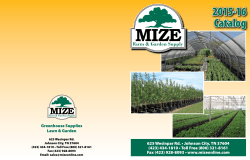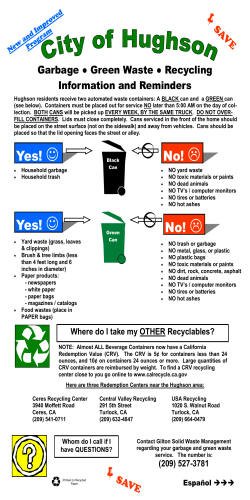
Recycle More FAQs
Contact: Matt Riggs, MARC Solid Waste Management District mriggs@marc.org 816-701-8313 Jon Ratliff, Trozzolo Communications Group jratliff@trozzolo.com 816-842-8111 Frequently Asked Questions What is the MARC Solid Waste Management District? The MARC Solid Waste Management District (MARC SWMD) serves as a regional solid waste planning agency for local governments in Cass, Clay, Jackson, Platte and Ray counties in Missouri, and works cooperatively with Johnson, Leavenworth, Miami and Wyandotte counties on the Kansas side of the Kansas City region. What does the MARC SWMD do? Our purpose is to encourage development of local and regional waste reduction, reuse and recycling programs by providing: • Grants to the public, private and nonprofit sectors. • The Regional Household Hazardous Waste Collection Program. • Technical assistance to local private and public entities. • Recycling information through RecycleSpot.org and the Recycling Information Line: 816-474-TEAM. What is the goal of the MARC SWMD? To divert 80 percent of waste from area landfills by 2023. Where can I find information on items that can be recycled in the metro area? A list of items to be recycled and reused, where to take them and other information can be found at recyclespot.org. Once recycled material leaves my curb or the recycling center, what happens to it? Materials are taken to a materials recovery facility (MRF). At the MRF, everything is sorted and baled. The MRF then ships the materials to brokers or directly to manufacturers. The recyclables are then made into new products, closing the recycling loop. There are three MRFs that serve the Kansas City metro area. This Waste Management video shows the step-by-step process of how materials are processed once they reach a facility. I’m just one person … how much of a difference can I make? You can make an enormous impact simply by making small changes in your waste habits. Each of us throws away about 7 pounds of waste a day. Instead of tossing those items into the garbage bin, think about how much could be diverted from landfills through waste reduction and recycling. And don’t forget that the three R’s (reducing, reusing and recycling) also have a number of other benefits for our community, the environment and your wallet. What do recycling fees pay for? Recycling is a service just like any other we service we pay for: trash pickup, gas, water, electricity, etc. Revenues cover the cost to collect, process and ship recyclable materials. If I’m not sure whether something is recyclable, should I go ahead and throw it in the bin? No, items that aren’t accepted by your recycling program contaminate and lower the value of the items that are accepted. To learn what can and can’t be recycled, contact your service provider. Why can’t I recycle certain materials? To successfully recycle something, three conditions must be met: • The ability to collect it. • The ability to process it. • A viable end market where companies purchase material and make new products with it. If any one of these three is not available within a region, the material cannot be recycled. What types of material can’t be recycled in the Kansas City metro area? Most of what we set out for the trash can be recycled, composted or reused. However, here are some common items that cannot be recycled: Type Examples Why can’t I recycle it? Styrofoam™ food containers Takeout cartons, egg cartons, meat trays, coffee cups Food contamination, low economic value Microwave food trays Meals Food contamination, low economic value Plastic flatware Plates, cups, utensils Food contamination, low economic value Medical & personal hygiene items Prescription bottles, syringes, diapers Hazardous Hazardous substance containers Automotive fluids, lawn and garden products, paint containers Hazardous Plastic bags made of multiple material types Potato chip, frozen vegetable, dog food, Ziploc®, coffee bags Made from multiple types of plastic resins or combined with other materials that cannot be recycled together Broken glass* Mirrors, windows, dishware, light bulbs Hazardous, low to no economic value * The only types of glass that can be recycled in the metro area are food and beverage containers. They can still be recycled if they are broken. How should I prepare recyclables for the recycle bin or drop-off center? Empty and rinse all containers, and flatten large plastic bottles and cardboard boxes. It’s okay to leave labels on containers, and caps and lid rings on plastic bottles. Are there any local businesses that make recyclables into new products? The following companies and organizations make and sell recycled-content and reusable products in the metro area: • Owens Corning – Makes fiberglass insulation from glass food and beverage containers collected by Ripple Glass. • Missouri Organic – Makes mulch and compost from yard waste and food waste collected in the metro area. • The Urban Lumber Company – Makes lumber out of locally harvested trees that have been discarded. • Elements of Green – A green building design company that makes recycled glass countertops and other items from locally recovered materials. • Habitat ReStore – Sells surplus and used building materials.
© Copyright 2025














